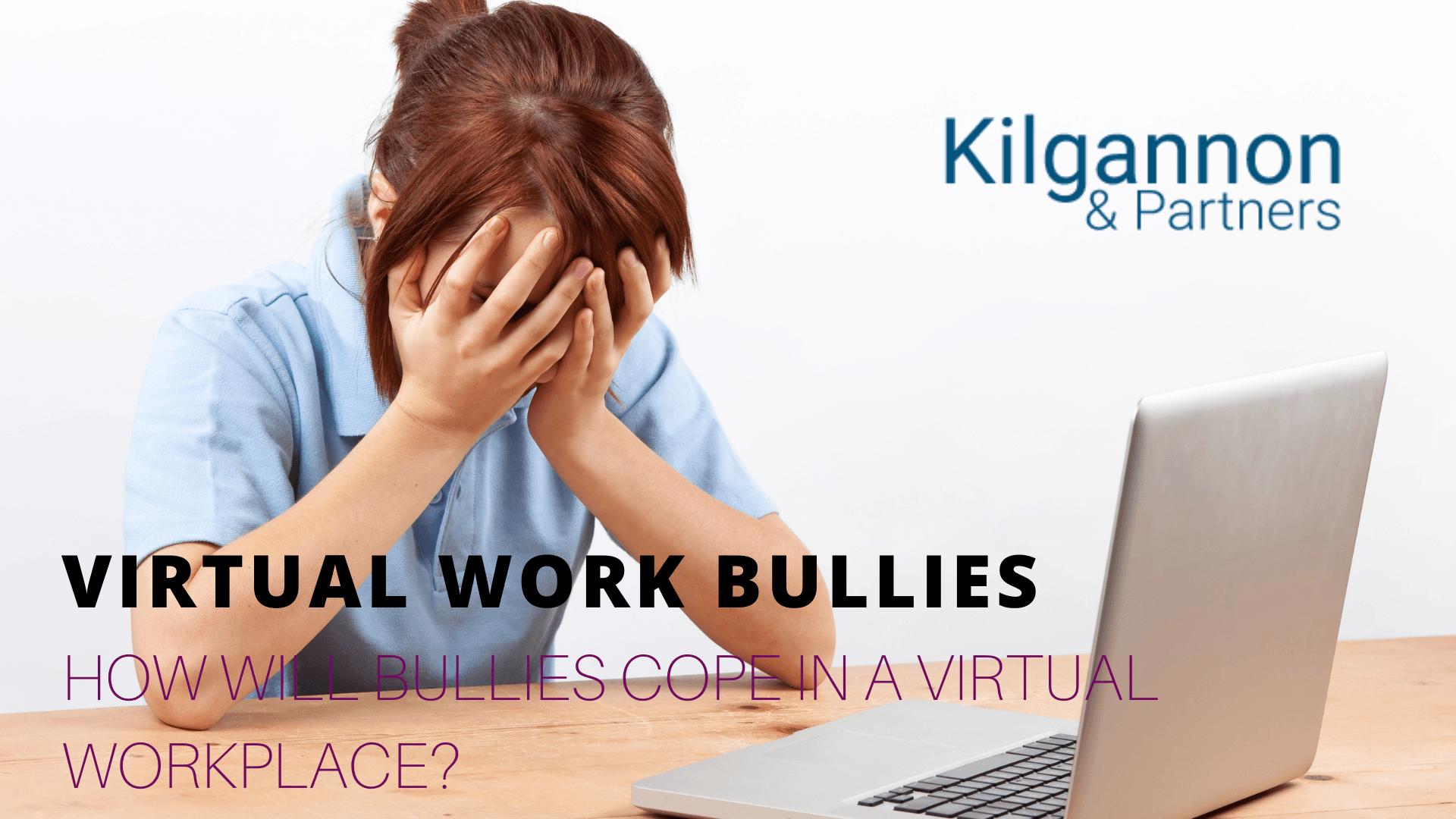How will bullies cope in a virtual workplace?
How will bullies cope in a virtual workplace?

Don’t worry, we are not supporting bullies nor condoning such behaviour. Instead, we are looking at what employers need to consider with remote working becoming more commonplace and how negative workplace behaviour may transcend the ‘new normal’.
According to ACAS, bullying is
“…behaviour from a person or group that's unwanted and makes you feel uncomfortable, including feeling:
● frightened ('intimidated')
● less respected or put down ('degraded')
● you’re made fun of and it makes you feel uncomfortable ('humiliated')
● upset (insulted or 'offended')
Examples of bullying in the workplace could include:
● someone has spread a false rumour about you
● someone keeps putting you down in meetings
● your boss does not let you go on training courses but they allow everyone else to
● your boss keeps giving you heavier workloads than everyone else
● your team never lets you join social events…”
When bullying occurs, the victim is unable to pursue a claim for just bullying, as there is no free-standing right to do so. Instead the victim has a few options as to how to react, including:
● claiming discrimination if s/he can show that the treatment amounts to discrimination and is occurring because of a protected characteristic (age, race, gender etc). If so, the claim is likely to be one of harassment; and/or
● resigning and claim constructive unfair dismissal, but two years’ service is required to claim this in the absence of discrimination.
We often advise on issues where there are allegations of bullying and, for those who have been subjected to it, the impact is often severe, particularly, on their well-being and mental health.
Historically, this will have traditionally occurred in the workplace. As such, that has greater chances of being witnessed and anyone who witnesses such behaviour will only have less respect for the employer if it is not dealt with swiftly and effectively. Once staff know it is happening, the undercurrent can have a significant and negative impact on businesses; particularly if those colleagues decide to leave because of the behaviours they witness.
With increased remote working we would like to think that there is less scope for bullies to operate as they are likely to have less face-to-face interaction with their victims. However, we are concerned that such behaviour will not reduce and, if anything, with staff working from home it may become discreet and harder to prove as there will be fewer witnesses in the absence of colleagues working together in an office/workplace environment.
With increased remote working there remain opportunities for bullying to occur whether by text message, video conference, email or telephone calls. There can still be offence caused with members of staff being intimidated or degraded or even given a heavier workload compared to colleagues.
But remote working may create greater opportunities for individuals to be able to evidence the bullying. While not condoned, it is probably easier for conversations to be covertly recorded. Further, where people are working from home, other members of the family/household may see or witness the behaviour and be able to intervene and speak up without fear of losing their job. If more occurs by text or email, there will be a written record again making it easier to evidence.
So, what can businesses do?
There are several steps that employers can take. These include:
● Providing training.
o Training can be to all staff on issues of diversity, including bullying and harassment.
o It can also be separate training for managers to help them understand what amounts to bullying and to encourage the avoidance of such behavioural traits.
● Managers and people teams can undertake more regular check-ins with staff; to see how they are and to check on their well-being.
● There could be increased appraisals/reviews, but with a wider number of people from the employer who may be able to encourage such issues to be raised.
● Employers could keep a closer eye on those with a known tendency for “strong management” to ensure they are behaving appropriately.
● Businesses can review their policies with particular focus on their culture and how they propose to embrace the new normal and what additional steps and measures they can take for the protection of their staff. Culture change is very difficult to get right, but if one of openness can be encouraged, employees may feel safer about raising concerns.
● Employees can put in place confidential helpline or employee assistance programs where staff can take and seek confidential support at the cost of the employer but without the employer being made aware. This may allow staff to see that the behaviour is wrong and give them confidence to raise the issue.
● Businesses can look at introducing new technology that helps track and measure employees’ engagement and well-being. We have recently seen a few apps that measure staff engagement, and they allow employers to quickly and easily identify areas of the business that may be a concern.
● While an extreme example, the business may want to record telephone calls between certain staff members for “training and monitoring purposes” if they know this is a discrete issue. By doing so, as a one-off, the verbal discussions may show that there is inappropriate behaviour happening. Of course, that will be difficult or, more likely, impossible, if staff are using personal devices to work from home.
From our perspective, what is certain is that bullying and harassment in the workplace is toxic.
With fewer staff working together in an office it may see bullies’ behaviour evolve and continue in a different way. They could, possibly, take advantage of colleagues being in isolation and, with staff being at home, any feeling of isolation may only intensify.
Protecting employees’ well-being is key for many employers and being alive to issues like this should help ensure they are quickly identified and avoided. After all, we are not concerned by how bullies may cope in a virtual workplace, but how their victims will.
If any of the issues discussed above are a concern to you, or if you would like specific advice, please contact the writer, Matthew Kilgannon, via mk@kilgannonlaw.co.uk
or on 01483 388 901.
Kilgannon & Partners LLP is a specialist employment law firm where our experienced employment law partners offer practical, prompt and professional employment law and HR advice.
19th October 2020. © Kilgannon & Partners LLP

A full time employee that is over 21 will soon be earning nearly £24,000 per annum which could mean that more employees are close to the minimum wage. Having an employee working close to the minimum wage poses risks to businesses. For example, if an employee works any overtime, they may then fall below the minimum wage.

The UK Home Office has expanded its sponsor licence priority services to offer greater flexibility and faster processing for prospective and current sponsors of migrant workers.
Removal of the Pre-Licence Priority Service Cap
Previously, the Home Office limited the number of daily applications for its pre-licence priority service to 30. This daily cap has now been removed. The pre-licence priority service is designed for organisations that have applied for a sponsor licence and seek to bring skilled workers to the UK more swiftly. By paying a £500 fee, applicants can reduce their waiting time from approximately eight weeks to around ten working days.

Kilgannon and Partners are pleased to post that our client, Carmen Chevalier-Firescu, has succeeded in defending an appeal from HSBC about the strike out of her claim in the Court of Appeal. Carmen’s claim was initially struck out by the East London Employment Tribunal. One of the reasons given was that it was not just and equitable to extend time. The Employment Appeal Tribunal decided that this needed to be revisited by the Tribunal. This led to HSBC appealing to the Court of Appeal to try and reinstate the original decision.

At Kilgannon and Partners, we are proud to support the movement towards more flexible working arrangements, as emphasised in the recent report by Pregnant Then Screwed. This groundbreaking report sheds light on the transformative impact flexible working can have on employees, employers, and society as a whole.

Unfair dismissal claims are among the most common types of cases brought before employment tribunals. Defending these claims effectively requires careful strategy, meticulous preparation, and a strong understanding of the legal complexities involved. This article outlines key strategies for UK employers to maximise their chances of success in unfair dismissal cases.






